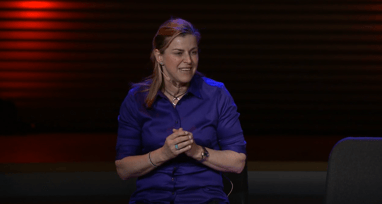Motivational speakers, unrealistic expectations and unintended reactions - Blog - Reeve Foundation
A good friend recently forwarded me a video that she ran across online that seemed to have relevance for anyone who was paralyzed due to a spinal cord injury. She knows the nature of my own injury, and is extremely knowledgeable about all types of disabilities due to her profession and leadership role in assistive technology and the independent living movement.
The feelings that watching this motivational presentation engendered in me were probably a bit different than the speaker might have anticipated from her audience members. I have been pondering why that is and must admit that it is probably because I have been in this situation--living with quadriplegia--for over 30 years and am probably a bit jaded when it comes to miracles and the power of positive thinking in overcoming paralysis.
The speaker in this video is a woman named Janine Shepherd who was an Olympic athlete for Australia but was hit by a truck during a training ride in the mountains and severely injured. She had multiple broken bones including a fractured spine and, like most of us, once she regained consciousness and started on the path of rehabilitation she received a diagnosis of permanent paraplegia with all of the complications that come along with that diagnosis. Unlike others who might not have been in such great shape when they became paralyzed, Ms. Shepherd's background in physical fitness and endurance sports made it impossible for her to accept what she was being told was inevitable.
Not long after she returned home she made the decision to learn to fly and become a licensed pilot. She was still unable to stand or walk unassisted, but that did not deter her from taking that first flying lesson even though she had no prior experience. During the next year she not only learned to fly but advanced through multiple levels of training and certification to finally receive a license as a flight instructor. She is now an aerobatics flight instructor and has three children that no doctor or specialist could have predicted during their initial examinations shortly after her accident.
As someone who took flying lessons in the early days before my spinal cord injury and additionally spent hundreds of hours accompanying my father in his private plane on long- distance trips, I have unbounded appreciation for her accomplishment. I believe that anyone who accomplishes that (earning a flight instructor certification) within one year has special talent and drive, and to do it as someone who is paraplegic is even more difficult. Yes, I know or have read about many pilots with spinal cord injuries or significant disabilities of different types but have no idea how many accomplished their goals in such a short timeframe, without prior experience.
distance trips, I have unbounded appreciation for her accomplishment. I believe that anyone who accomplishes that (earning a flight instructor certification) within one year has special talent and drive, and to do it as someone who is paraplegic is even more difficult. Yes, I know or have read about many pilots with spinal cord injuries or significant disabilities of different types but have no idea how many accomplished their goals in such a short timeframe, without prior experience.
Like the audience present when the videotape was made, I found myself marveling at the extent of her injuries and how quickly she had changed the course of her life. With personal experience in receiving a diagnosis of permanent paralysis, I know how devastating the opinion of a single medical professional can be if given at the wrong time or in the wrong manner.
Perseverance and refusal to accept her fate were traits that likely helped her in her athletic endeavors, before she was hit by the truck. Unfortunately, not everyone has that level of drive or determination in order to reach their goals; a sense of empowerment and the positive thinking that comes along with it can disappear quickly when the words "permanent paralysis" are spoken repeatedly by those who should know.
The audience members at the presentations I watched were very appreciative and free with their applause. I have a great level of admiration for who she is and what she has accomplished but at the end of the presentations I found myself concerned about the inadvertent impact of her story on the hundreds of thousands of individuals who have not been able to reclaim movement or the many bodily functions related to paralysis but instead struggle to remain healthy and independent--despite thinking positively and trying to be empowered.
Do these types of motivational presentations create unrealistic expectations among family members and friends, who subsequently might believe that an individual is simply not working hard enough or they would be overcoming the effects of paralysis?
Those of us living with spinal cord injuries or other paralyzing diseases are like snowflakes; no two of us, even if injuries are at the same level, are identical. We need to keep that in mind at all times.
© 2018 Michael Collins
Join Our Movement
What started as an idea has become a national movement. With your support, we can influence policy and inspire lasting change.
Become an Advocate